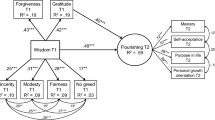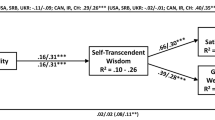Abstract
Practical wisdom is a master character strength that is needed when specific virtues must be translated into concrete action. Although scholars have discussed practical wisdom since the time of Aristotle, empirical research on this master virtue has been hampered by problems involving conceptualization and measurement. The primary purpose of the current study is to assess the relationship between practical wisdom, self-esteem, and hope. This is accomplished by evaluating the relationships between self-esteem, hope, and a second-order confirmatory factor model which specifies that nine specific virtues (e.g., humility, compassion) are determined by a more abstract, higher-order construct that represents practical wisdom. This model is estimated with data from a recent nationwide survey of middle-aged and older adults. Two main findings emerge from the analyses. First, the data suggest that greater practical wisdom is associated with stronger feelings of self-worth and greater hope. Second, the findings reveal that the second-order factor model of fits the data well.

Similar content being viewed by others
Notes
The standardized factor loadings for the three self-esteem items are as follows (standardized measurement error terms are in parenthesis): .840 (.294), .858 (.263), .815 (.335). The standardized factor loadings for the four items that assess hope are as follows: .736 (.458), .786 (.382), .781 (.389), .841(.293).
References
Ardelt, M. (2003). Empirical assessment of a three-dimensional wisdom scale. Research on Aging, 25, 275–324.
Aristotle. (2000). Nicomachean ethics. In R. Crisp (Ed.), New York: Cambridge University Press.
Baltes, P. B. (2004). Wisdom as orchestration of mind and virtue. Unpublished manuscript: http://library.mpib-berlin.mpg.de/ft/pb/PB_Wisdom_2004.pdf.
Baltes, P. B., & Staudinger, U. M. (2000). Wisdom: A metaheuristic (pragmatic) to orchestrate mind and virtue toward excellence. American Psychologist, 55, 122–136.
Baumeister, R. F. (1991). Meanings of life. New York: Guilford.
Baumeister, R. F., & Exline, J. J. (1999). Virtue, personality, and social relations: Self-control as moral muscle. Journal of Personality, 67, 1165–1194.
Bergsma, A., & Aredelt, M. (2012). Self-reported wisdom and happiness: An empirical investigation. Journal of Happiness Studies, 13, 481–499.
Bohrnstedt, G. W. (1983). Measurement. In P. H. Rossi, J. D. Wright, & A. B. Anderson (Eds.), Handbook of survey research (pp. 70–121). New York: Academic Press.
Brugman, C. M. (2006). Wisdom and aging. In J. E. Birren & K. W. Schaie (Eds.), Handbook of the psychology of aging (pp. 445–476). San Diego, CA: Elsevier Academic Press.
Cattell, R. B. (1978). The scientific use of factor analysis in behavioral and life sciences. New York: Plenum.
Cessario, R., Titus, C. S., & Vitz, P. C. (2013). Philosophical virtues and psychological strengths. Manchester, NH: Sopia Institute Press.
Cohen, J., Cohen, P., West, S. G., & Aiken, L. S. (2003). Applied multiple regression/correlation analysis for the behavioral sciences (3rd ed.). Mahwah, NJ: Lawrence Erlbaum.
Davis, D. E., Worthington, E. L., Nook, J. N., Emmons, R. A., Hill, P. C., Bollinger, R. A., et al. (2013). Humility and the development and repair of social bonds: Two longitudinal studies. Self and Identity, 12, 58–77.
DeShon, R. P. (1998). A cautionary note on measurement error correlations in structural equation models. Psychological Methods, 3, 412–423.
du Toit, M., & du Toit, S. (2001). Interactive LISREL: User’s guide. Lincolnwood, IL: Scientific Software International.
Emmons, R. A. (2004). The psychology of gratitude: An introduction. In R. A. Emmons & M. E. McCullough (Eds.), The psychology of gratitude (pp. 3–16). New York: Oxford University Press.
Emmons, R. A., McCullough, M. E., & Tsang, J. (2003). The assessment of gratitude. In S. J. Lopez & C. R. Snyder (Eds.), Positive psychological assessment: A handbook of models and measures (pp. 327–341). Washington, DC: American Psychological Association.
Enders, C. C. (2010). Applied missing data analysis. New York: Guilford.
Etezadi, S., & Pushkar, D. (2013). Why are wise people happier? An explanatory model of wisdom and emotional well-being in older adults. Journal of Happiness Studies, 14, 929–950.
Fetzer Institute/National Institute on Aging Working Group. (1999). Multidimensional measurement of religiousness/spirituality for use in health research. Kalamazoo, MI: John E. Fetzer Institute.
Fowers, B. J. (2012). Placing virtue and the human good in psychology. Journal of Theoretical and Philosophical Psychology, 32, 1–9.
Hall, S. S. (2010). Wisdom: From philosophy to neuroscience. New York: Random House.
Kelloway, E. K. (1998). Using LISREL for structural equation modeling. Thousand Oaks, CA: Sage.
Krause, N. (1999). Assessing change in social support during late life. Research on Aging, 21, 539–569.
Krause, N. (2002a). Church-based social support and health in old age: Exploring variations by race. Journal of Gerontology: Social Sciences, 57B, S332–S347.
Krause, N. (2002b). A comprehensive strategy for developing closed-ended survey items for use in studies of older adults. Journal of Gerontology: Social Sciences, 57B, S263–S274.
Krause, N. (2009). Church-based volunteering, providing informal support at church, and self-rated health during late life. Journal of Aging and Health, 21, 63–84.
Krause, N. (2012). Feelings of gratitude toward God among older whites, older African Americans, and older Mexican Americans. Research on Aging, 34, 156–173.
Krause, N., & Alexander, G. (1990). Self-esteem and psychological distress in late life. Journal of Aging and Health, 2, 419–438.
Krause, N., & Ellison, C. G. (2003). Forgiveness by God, forgiveness of others, and psychological well-being in late life. Journal for the Scientific Study of Religion, 42, 77–93.
Kristjansson, K. (2012). Positive psychology and positive education: Old wine in new bottles? Educational Psychologist, 47, 86–105.
Leffel, G. M. (2011). Beyond meaning: Spiritual transformation in the paradigm of moral intuitionism: A new direction for the psychology of spiritual transformation. Research in the Social Scientific Study of Religion, 22, 25–125.
Lundberg, G. D. (2010). Unifying truths of the world’s religions. New Fairfield, CT: Heavenlight Press.
Moraitou, D., & Efklides, A. (2012). The Wise Thinking and Acting Questionnaire: The cognitive facet of wisdom and its relation with memory, affect, and hope. Journal of Happiness Studies, 13, 849–873.
Nunnally, J. C., & Bernstein, I. H. (1994). Psychometric theory (3rd ed.). New York: McGraw-Hill.
Peterson, C., & Seligman, M. E. P. (2004). Character strengths and virtues: A hand book and classification. New York: Oxford University Press.
Richardson, F. C. (2012). On psychology and virtue ethics. Journal of Theoretical and Philosophical Psychology, 32, 24–34.
Rosenberg, M. (1965). Society and the adolescent self-image. Princeton, NJ: Princeton University Press.
Saroglou, V. (2013). Religion, spirituality, and altruism. In K. I. Pargament (Ed.), APA handbook of psychology, religion, and spirituality (Vol. 1, pp. 439–457). Washington, DC: American Psychological Association.
Scheier, M. F., & Carver, S. C. (1985). Optimism, coping, and health: Assessment and implications of generalized outcome expectancies. Health Psychology, 4, 219–247.
Schwartz, B., & Sharpe, K. E. (2006). Practice wisdom: Aristotle meets positive psychology. Journal of Happiness Studies, 7, 377–395.
Sprecher, S., & Fehr, B. (2005). Compassionate love for close others and humanity. Journal of Social and Personal Relationships, 22, 629–651.
Staudinger, U. M., & Gluck, J. (2011). Psychological wisdom research: Commonalities and differences in a growing field. Annual Review of Psychology, 62, 215–241.
Stets, J. E., & Burke, P. J. (2003). A sociological approach to self and identity. In M. R. Leary & J. P. Tangney (Eds.), Handbook of self and identity (pp. 128–152). New York: Guilford.
Taylor, M., Bates, G., & Webster, J. D. (2011). Comparing the psychometric properties of two measures of wisdom. Experimental Aging Research, 37, 129–141.
Triandis, H. C. (1995). Individualism and collectivism. Boulder, CO: Westview.
Widaman, K. F. (2012). Exploratory factor analysis and confirmatory factor analysis. In H. Cooper (Ed.), APA handbook of research methods in psychology (Vol. 3, pp. 361–389). Washington, DC: American Psychological Association.
Zagzebski, L. T. (1998). Virtues of the mind: An inquiry into the nature of virtue and the ethical foundations of knowledge. New York: Cambridge University Press.
Acknowledgments
This research was supported by Grants from the John Templeton Foundation and the National Institute on Aging (RO1 AG014749).
Author information
Authors and Affiliations
Corresponding author
Rights and permissions
About this article
Cite this article
Krause, N., Hayward, R.D. Virtues, Practical Wisdom and Psychological Well-Being: A Christian Perspective. Soc Indic Res 122, 735–755 (2015). https://doi.org/10.1007/s11205-014-0709-4
Accepted:
Published:
Issue Date:
DOI: https://doi.org/10.1007/s11205-014-0709-4




